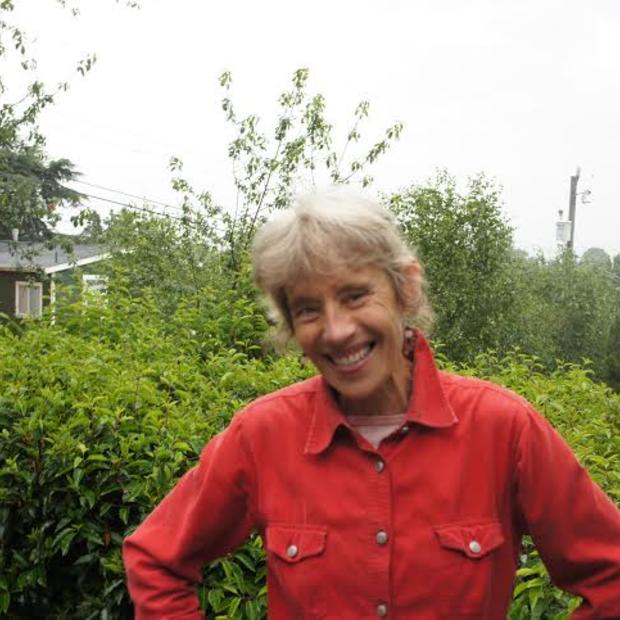Introduction: The multi-ethnic churches call it "Moving Together in Faith and Health." Grow healthy food on site, educate about healthy living, and change the health patterns of your congregation. Add a federal grant, an engaged School of Nursing and county health department and last, but not least, a non-profit called the “Just Garden Project” and you have all the ingredients you need for one of Seattle’s newest urban garden projects.
Click on the audio player above or here to listen.
Narration: With Green Acre Radio this is Martha Baskin.
Dr. Doris Boutain checks her list to make sure we've visited all of the churches who are building or expanding on-site gardens. Boutain and the University of Washington School of Nursing, where she teaches, were looking for ways to prevent chronic disease within King County’s minority community. Diabetes and mortality rates for African-Americans in King County are among the highest in the nation. While obesity is at least twice as high for high school students who are African-American, Latino or Pacific Islander. “For a number of people of color they are looking toward the church not only for faith information not only as a faith haven but also as a haven for health guidance.” That’s when the idea for a grant called “Moving Together in Faith and Health” was born. Bring faith based organizations together to grow healthy food and educate congregations. “We’re more about making impactful sustainable change than anything else and connecting right in their own backyard. Back yard connections that’s what we’re making today.”
The backyard connections came about through a series of events. Seattle King County Public Health was awarded federal stimulus dollars to develop healthy polices to improve access to nutrition. In early spring, Boutain and her team at the University of Washington decided to apply for a grant on behalf of minority churches. Improving health was a top priority.
At about the same time, church health ministers and chefs attended a fundraiser for Clean Greens, a farm started by the largely African-American New Hope Baptist Church. At the fundraiser the church health ministers learned about an opportGreen Acre Radio is supported by the Human Links Foundation. Engineering by CJ Lazenby. Produced through the Jack Straw Foundation and KBCS.unity they could take advantage of called the "Just Garden Project." Rev. Carey Anderson with First AME Church says it’s been a cultural shift but the church is on board. “We're talking about a coop and how to empower people and how to show people that they can live a good life, a quality of life. We're excited and we’re very pleased to see this turnout today.”
As the First AME choir sings God’s praise during rehearsal, minority churches throughout the area, sing His praise with new garden beds. Theresa M. Bash is Youth Minister at Immaculate Conception: "The children are very important to me and moving together in faith means a lot. It really does. Our kids are typically ones that would get high blood pressure, diabetes. We’re trying to prevent that.” She goes back to digging on a rare sunny day. “In Seattle, no rain. Praise God it will be wonderful the kids will be able to see things grow and come out and water and so every Sunday we’ll bring the kids out to look at the progress."
Progress is likely inevitable given the experience of many involved. Sharon Pitre-Williams is chef for the Moving Together in Faith and Healing project at Immaculate Conception. A seasoned gardener, Pitre-Williams was already using organic produce from two plots in an adjacent neighborhood p-patch. But new beds will allow the church to increase the volume and type of vegetable they grow for their multi-ethnic congregation. "We know that diabetes and high blood pressue runs pretty high in the African-American and Filipino community so we decided over a year ago that we were going to start serving healthy food after our Masses.”
At Tabernacle Missionary Baptist Church growing healthy food is a new exercise in faith and health. To say the community excited is an understatement. Sanithia Parker, Health Minister Lead, admires new raised beds. "It’s just amazing and then it's just amazing because the people that have come out you can see, as soon as we started digging, they’re like, 'Yes, we can do this and we can do that.' " Cabbage, strawberries and herbs are the first to be planted. Then brussel sprouts per request. Church members are already talking more beds or planting straight in the ground. There’s more south facing land here than all the other churches combined. Myeesha Parker is involved with one of Tabernacles youth feeding programs. She plans to integrate growing food into the bible study class she teaches. "Some of these kids attend my class so i’m glad we’re kind of doing a test pilot on them to see will it stick to them?"
There’s no doubt it will. With initiative, faith, a little grant money and a supportive community, the project called "Moving Together in Faith and Health" is building "just gardens" not only for this season, but for those yet to come. Neighborhood farmers markets are being planned, new connections with food coops and grocery stores and even seasonal recipe books. For more on Just Gardens go to springintobed.org.
Green Acre Radio is supported by the Human Links Foundation. Engineering by CJ Lazenby. Produced through the Jack Straw Foundation and KBCS.



